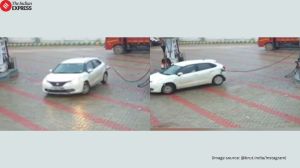CAQM reviews action plan for stubble burning, vehicular emissions with Punjab, Haryana
Field visits were held the next day to review on-ground progress in Punjab and Haryana
 Concerning Haryana, the review touched upon key issues such as the state’s action plan to eliminate paddy stubble burning in 2025 (File)
Concerning Haryana, the review touched upon key issues such as the state’s action plan to eliminate paddy stubble burning in 2025 (File)From eliminating stubble burning to curbing vehicular emissions to intensifying road dust abatement measures – the Commission for Air Quality Management in NCR and Adjoining Areas (CAQM) earlier this week held high-level meetings with Punjab and Haryana governments to review their preparedness to implement pollution control measures.
In a statement issued on Saturday, the CAQM said the meetings took place on Thursday in Chandigarh. Chief Secretaries and senior officials from both states attended the meeting.
Concerning Haryana, the review touched upon key issues such as the state’s action plan to eliminate paddy stubble burning in 2025, the use of paddy straw-based biomass pellets in brick kilns, and compliance with thermal power plant emission norms. The Commission also reviewed the target of 5% biomass co-firing in thermal plants for 2025–26.
Progress on road dust mitigation, especially related to the redevelopment of identified roads, as well as the CAQM’s earlier directions on curbing vehicular emissions, were discussed. These include the liquidation of end-of-life vehicles, the installation of ANPR camera systems (as per its April directions), and the shift to clean mobility among aggregators, delivery services, and inter-city buses. The meeting also reviewed the phasing out of diesel autorickshaws.
In its meeting with Punjab, the CAQM focused on the implementation of the state’s approved plan to eliminate paddy stubble burning in 2025.
As per the statement, the Commission assessed the mandatory use of biomass pellets in brick kilns and reviewed thermal power plants’ compliance with emission norms, including biomass co-firing targets.
Similar to its review of the Haryana government, vehicular pollution control norms were reviewed.
Field visits were held the next day to review on-ground progress in Punjab and Haryana. These included inspections of projects such as pelletisation plants, compressed bio-gas units, biomass power generation plants, 2G ethanol plants, and industrial boilers.
The Commission underlined the need for “enhanced coordination, targeted implementation of the action plans, and strict enforcement” of statutory directions. It called for sustained action and collective responsibility to ensure “visible and measurable” improvement in regional air quality, especially in view of the upcoming winter season.












